Overview
- Brief Narrative
- Large baby doll owned by Betti Blaugrund that originally belonged to 7 year old Aline Klajn. Aline and her family were deported on October 24, 1942, from Uccle, Belgium, to Auschwitz concentration camp where they were killed. Aline's parents, Idessa and Wigdor, and Idessa's large extended family, came to Belgium from Poland in the 1920s. In May 1940, Belgium was occupied by Nazi Germany. In summer 1942, the Germans acted on their plan to get rid of all the Jews in Belgium. Aline, her parents, and her brother Jacques, 5, were given refuge by Alfred and Clara Duval; several family members hid in a nearby apartment. On October 20, Aline and Idessa went to the apartment to borrow sugar, and it was raided by German officers. Wigdor and Jacques arrived looking for Idessa and were also arrested. Only Aline's uncle Wolf escaped. The nine who were arrested were killed in Auschwitz. Wolf, his wife Cypra, and their infant Betti, born that July, survived the war in hiding.
- Date
-
received:
after 1942 October
- Geography
-
manufacture:
Japan
received: Uccle (Belgium)
- Credit Line
- United States Holocaust Memorial Museum Collection, Gift of Betti Blaugrund
- Markings
- reverse, upper back, trademark, molded : fleur de lis symbol / ROYAL / MADE IN JAPAN / 24"
- Contributor
-
Subject:
Aline Klajn
Subject: Betti Blaugrund
- Biography
-
Aline Klajn (Klein) was born on May 6, 1935, in Brussels, Belgium, to Idessa (Ida/Yehudit) Berlinska and Wigdor Fawel (Victor) Klajn. Wigdor was born on July 17, 1905, to David and Regina Klajn in Łódź, Poland. Ida was born on April 2, 1903, to Jacob and Laja Berlinski in Pabianice, Poland, near Łódź. Ida was one of eight children in her Orthodox Jewish family: four boys, Hersz, born 1900, Barukh (Bruno), Willy (Ze’ev), born 1910, and Israel-Elyasz, born 1905, and four girls, Szewa-Mindel, Idessa, Lena, born 1908, and Cypra (Tsipora) Guitel, born March 14, 1912. Idessa’s father, Yacob-David, born 1878, was the son of Hersz Berlinski. Her mother, Laja, was born in Zdunska-Wolf on May 15, 1976, the eldest daughter of Mosche-Leib Maslo. Yacob, a wood trader, died in 1916. All the children had to work to support the family. Cypra took care of the household; Bruno went to live with a maternal aunt, Mrs. Abba Kempinski, in Praszka. The eldest brother, Hersz, died in 1918 from a fall on his bicycle. Szewa married Isaac Starc, moved to Breslau, and had two children: Jacob-David, born in 1919, and Gerda, born in 1922. Lena went to assist the couple who were itinerant fur merchants. In 1925, they moved to Anderlecht, a Jewish immigrant community in Brussels, Belgium. They asked Laja to join them and in 1926, Laja, Willy, and Cypra left Blaszki for Anderlecht. Idessa and Israel arrived the next year. Everyone worked in Belgium to help support the family.
In 1933, Bruno arrived from Germany after Hitler’s rise to power. Ida married Wigdor Klajn, an itinerant merchant, born on July 17, 1905, in Sokolniki, Poland. Aline was joined by a younger brother on May 27, 1936. Idessa’s brother Israel married Rywka Frenkiel, born October 24, 1910, in Varsovie, Poland. They left for Palestine, where they had a daughter on March 1, 1935. Israel’s health did poorly there, so they returned to Belgium and had a son Jacques, born December 16, 1936. Lena wed Leon Guze and a daughter Charlotte was born on October 7, 1936. Willy died of an infection after dental work in 1939.
On May 10, 1940, Germany invaded Belgium. Most of the family fled south to France which was conquered by Germany in June. While they were living in Revel, near Toulouse, Idessa’s sister Cypra married Wolf Blaugrund on August 18, 1940. Wolf, a diamond cutter, was born on July 21, 1901, in Neu-Sandez, Austria (Nowy-Sacz, Poland). Life was very hard in France and they were humiliated by anti-Jewish treatment. Feeling increasingly unsafe in Vichy France, the families returned separately to their homes in Belgium. The Jews of Belgium were required to register with the authorities by October 28, 1940. In mid-1942, Wigdor and Idessa, and Idessa’s siblings, received a notice to report for forced labor in Germany. They suspected that they would be sent to concentration camps and decided to go into hiding. Aline, her parents, Wigdor and Idessa, her brother Jacques, and grandmother Laja were given refuge by Alfred and Clara Duval, who owned a butcher shop. Cypra, Wolf, Israel, and Rywka moved into an apartment rented by Gertrude Tichy, Bruno’s half-Jewish Austrian wife whom he married in 1942. Israel’s children, Aviva and Jacques Berlinski, were taken in by a non-Jewish family. By fall, the Germans had begun deporting Jews from Belgium to Auschwitz concentration camp in Poland. In August 1942, Szewa and her husband Isaac paid someone to smuggle them into France; they were abandoned at the border and deported to an internment camp in France and eventually to Auschwitz.
On October 20, 1942, Idessa and Aline went to borrow sugar from her family members living at Gertrude’s apartment. The rule in the household was to not answer the doorbell, but to escape over the ladder kept against the backyard wall. But this time when the bell rang around 4:00 PM, Gertrude answered and two German officers rushed in. Wolf ran out the back door and was stopped by the Germans in the garden. Idessa had left food cooking on the stove and when his wife did not return, Wigdor went with Jacques to get her. About the same time, another sister, Lena, with five year old Charlotte, went to visit, as did another relative, Jacob-David Starc. Jacob had been passing as a non-Jew and had recently been arrested but released. One of the Germans at Gertrude’s had been involved in that arrest and hit Jacob for lying to him before. They interrogated everyone in the house regarding their Jewish origins. Wigdor denied it and was beaten.
Wolf was isolated in a bedroom and told to pack a suitcase. He decided to change and, seeing him in his underwear, the German left the room and shut the door. Wolf fled out a side door and hid until, afraid that Cypra would return, he knocked at a door and begged them to let him telephone his wife. Cypra was not at home. She had an infant, Betti, born on July 17, 1942, whom she had placed in hiding and was out visiting her.
All the others were arrested and taken to the Malines transit camp. Aline and her parents were deported on transport XV/318 on October 24 to Auschwitz; the others were also sent to Auschwitz where they were murdered.
Betti Blaugrund was born in Uccle, Belgium, on July 16, 1942, to Ze’ev (Wolf) Blaugrund and Cypra (Tsipora) Guitel-Berlinska, b. March 14, 1912, in Pabianice near Łódź, Poland. Cypra was the youngest of 8 in an Orthodox Jewish family: 4 boys, Hersz, b. 1900, Barukh (Bruno), Willy, b. 1910, and Israel-Elyasz, b. 1905, and 4 girls, Szewa-Mindel, Lena, b. 1908, and Idessa (Ida), b. 1903. Cypra’s father, Yacob-David, b. 1878, was the son of Hersz Berlinski. Her mother, Laja, was born in Zdunska-Wolf, on May 15, 1976, the eldest daughter of Mosche-Leib Maslo. Yacob, a wood trader, died in 1916. All had to work to support the family. Cypra took care of the household. Hersz died in 1918. Bruno went to live with a maternal aunt, Mrs. Abba Kempinski, in Praszka. Szewa married Isaac Starc, moved to Breslau, and had 2 children: Yacob-David, b. 1919, and Gerda, b. 1922. Lena went to assist the couple who were itinerant fur merchants. In 1925, they moved to Anderlecht, a Jewish immigrant community in Brussels, Belgium. In 1926, Laja, Willy, and Cypra left Blaszki and joined them; Idessa and Israel arrived the next year.
In Belgium, Cypra learned French and worked as a manual laborer. In 1933, Bruno arrived from Germany after Hitler’s rise to power. Ida married Wigdor Klajn, an itinerant merchant, b. July 17, 1905, in Sokolniki, Poland, and had 2 children, Aline, b. May 6, 1935, and Jacob-Kalman, b. May 27, 1936. Israel married Rywka Frenkiel, b. October 24, 1910, in Varsovie, Poland. They left for Palestine, and had a daughter on March 1, 1935. Israel’s health did poorly there, so they returned and had a son Jacques, b. December 16, 1936. Lena wed Leon Guzy and Charlotte was born October 7, 1936. Willy died of an infection in 1939.
Betti’s father Wolf was born on July 21, 1910, to Abraham-Haim Blaugrund and Bra’ha Kollender in Neu-Sandez, Austria (Nowy-Sacz, Poland). He was the 4th of 9 in a Hassidic family: Barukh, b. 1902, Salomon, b. 1905, Frieda, b. 1908, Aharon, b. 1912, Reiser-Perl, b. 1916, Ryfka, b. 1918, Moische, b. 1920, and Rukhla, b. 1922. Barukh left for Antwerp in 1928, joined by Wolf in 1929, then Frida, after their mother’s death in 1930. Wolf trained as a diamond cutter.
Betti’s parents became acquainted in March 1940. On May 10, Belgium was invaded by Germany. Cypra’s family, with Wolf, now her fiance, fled to France which was occupied by Germany in June. Cypra and Wolf married on August 18, 1940, in Revel, near Toulouse. They were harassed for being Jewish and, feeling unsafe in Vichy France, returned to Uccle. In mid-1942, Betti’s parents were to report for forced labor in Germany. They suspected they would be sent to concentration camps and decided to go into hiding. Cypra, Wolf, Israel, and Rywka moved into an apartment rented by Gertrude Tichy, Bruno’s half-Jewish Austrian wife. Israel’s children, Aviva and Jacques Berlinski, were taken in by a non-Jewish family. The Klajn’s and Laja were given refuge with Alfred and Clara Duval. In August 1942, Szewa and her husband, abandoned by someone paid to smuggle them into France, were deported.
Cypra searched for a place to hide her baby. She was refused by a convent “since there were already enough.” She found a woman who took 6 week old Betti for a fee. Cypra visited weekly. Her obstetrician also visited and, seeing the baby covered with sores due to neglect, reprimanded the caretaker, who began bathing her regularly. Cypra wanted to take her back, but Wolf convinced her that while the baby had a right to live, she did not have the right to die with them. On October 20, Cypra planned to take Betti away and told the doctor, who told her to be patient for the caretaker might denounce them. He left without leaving the prescription and Cypra went to his office. As he let her in, the phone rang; it was Wolf who told her not to come home, and gave instructions to meet later.
The rule in the home where they hid, the rule was to not answer the doorbell, but to escape over the backyard wall. But this time when the bell rang, Gertrude answered and 2 German officers rushed in. They stopped Wolf in the garden; he went to change and, seeing him in his underwear, the German left the room and shut the door. Wolf fled out a side door and hid until, afraid that Cypra would return, he knocked at a door and begged them to let him telephone his wife. Cypra’s sisters, Ida and her daughter, and Lena with hers were visiting; Wigdor came with their son to get Ida - all 9 were arrested. Thinking everyone was gone, Laja wanted to leave her hiding place and join her family, but the Duval’s convinced her to stay for the baby’s sake. A short while later, Wolf and Cypra arrived at the Duval’s, and were given refuge. They retrieved Betti, but the Duval’s said a 3 month old child was too risky as her cries would attract attention.
Alfred Duval asked a friend, Louis Paesen, the assistant police superintendent, to come see him at his butcher shop. Alfred asked if he was a “good Belgian” while threatening him with his butcher knife. Louis asked him why he was acting this way and Alfred told him that he had to hide a Jewish infant and he thought Louis and his wife could handle it. Louis talked it over with his wife Anna. They did not see how they could manage it, but Anna’s sister, Odile and her husband, Louis Ceulemans, in Aarschot, had in the past fostered a child. They agreed to take Betti.
Cypra refused to release her daughter to strangers a 2nd time. Odile and her 19 year old daughter Rosa came to Brussels to reassure her and promised to bring Betti to Brussels monthly. Cypra relinquished Betti and gave Odile family photographs which she would show to Betti every day, explaining that these were her real parents. The photos were placed in an armoire that Betti came to call “Papa kast en Mama kast” (kast is Flemish for armoire.) Odile, whom Betti called Mama Dileke, b. March 14, 1902, was a devout Catholic. With Betti, they visited Brussels monthly where she played with the Paesen’s girls. Because of the danger of so much travel, Rosa’s fiance, Richard Elseviers, a street-car conductor, created a signal to warn Rosa and her mother when a train was to be checked by Gestapo. The Ceulemans-Gryson’s lived on a small farm and Betti was fed fresh milk and eggs and recovered her health.
Brussels was liberated by Allied troops in September 1944 and when Cypra arrived to get Betti, she was in her best clothes, waiting with Odile on the sidewalk. Most of her maternal relatives who resided in Belgium were killed in Auschwitz. Most of those in her father’s family who had stayed in Poland perished.
After the war, Cypra, Wolf, Betti, and Laja settled in Andrelecht. Betti married and had two daughters. Laja died in 1962. Wolf, 69, died in 1979. Cypra, 95, passed away in 2007.
Physical Details
- Language
- English
- Classification
-
Toys
- Category
-
Dolls
- Object Type
-
Dolls (lcsh)
- Physical Description
- Large, molded celluloid, painted light skinned female baby doll with an articulated neck, shoulder, and leg joints. She has ear length molded hair painted dark brown and worn in a right side part with end curls. She has painted facial features: dark brown eyebrows, blue eyes, round pinkish chubby cheeks, and a red bow mouth. The tops of her hands and feet have a slight blush, well defined nails, and dimpled knuckles; she has a defined navel. The paint has worn off some areas. On the reverse is a manufacturer’s mark, English text, and a number.
- Dimensions
- overall: Height: 24.000 inches (60.96 cm) | Width: 9.500 inches (24.13 cm) | Depth: 5.375 inches (13.653 cm)
- Materials
- overall : celluloid, paint
Rights & Restrictions
- Conditions on Access
- No restrictions on access
- Conditions on Use
- No restrictions on use
Keywords & Subjects
- Topical Term
- Hidden children (Holocaust)--Belgium--Biography. Holocaust, Jewish (1939-1945)--Belgium--Brussels--Personal narratives. Jewish children in the Holocaust--Belgium--Brussels--Biography. Jewish families--Belgium. World War, 1939-1945--Deportations from Belgium.
- Geographic Name
- Belgium--History--German occupation, 1940-1945.
Administrative Notes
- Legal Status
- Permanent Collection
- Provenance
- The doll was donated to the United States Holocaust Memorial Museum in 2011 by Betti Blaugrund, the cousin of Aline Klajn.
- Funding Note
- The cataloging of this artifact has been supported by a grant from the Conference on Jewish Material Claims Against Germany.
- Record last modified:
- 2023-06-13 16:18:27
- This page:
- https://collections.ushmm.org/search/catalog/irn47494
Download & Licensing
In-Person Research
- By Appointment
- Request 21 Days in Advance of Visit
- Plan a Research Visit
- Request to See This Object
Contact Us
Also in Betti Blaugrund collection
The collection consists of a baby doll, and infant and doll clothing relating to the experiences of Betti Blaugrund in Belgium before and during the Holocaust when, as an infant, she was placed in hiding with Louise and Udile Ceulemans-Gryson, and of her cousin, Aline Klajn, who was deported and killed in a concentration camp during the Holocaust.
Date: 1942-approximately 1955

White drawstring hand coverings worn by a Jewish infant living in hiding
Object
Baby mitts with a drawstring worn by Betti Blaugrund when, as an infant, she lived in hiding with Louise and Udile Ceulemans-Gryson in Aarschot, Belgium. Betti was three months old when the Gryson's gave her a safe home in October 1942. She was covered with sores and tried so often to scratch herself that her mother had restrained her. The Grysons made these coverings so she could use her hands and not hurt herself. Betti's parents, Cypra and Wolf, fled to France when Belgium was occupied by Germany in May 1940, but returned because of antisemitism. In summer 1942, the Germans acted on their plan to get rid of all the Jews in Belgium. Betti was born on July 16. The family was told to report for forced labor. They suspected they would be deported and went into hiding. It was too unsafe to hide with a baby, so Cypra found a non-Jewish woman who took in Betti for money. Cypra and Wolf hid in an apartment with several family members. One day, Cypra was out visiting Betti, and the home was raided. Nine people in the house were arrested; only Wolf escaped and warned Cypra not to come home. They found a new place to hide and found a Gentile family in the country to provide better care for Betti. The Grysons loved the baby like their own and took her to see her mother every month as promised. Belgium was liberated by Allied Forces in September 1944 and Betti rejoined her parents. Both Cypra and Wolf were from very large families; nearly all of their relatives perished.
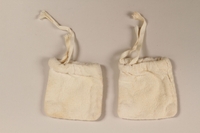
White plush hand coverings worn by a Jewish infant while living in hiding
Object
Soft, plush baby mitts worn by Betti Blaugrund when, as an infant, she lived in hiding with Louise and Udile Ceulemans-Gryson in Aarschot, Belgium. Betti was three months old when the Gryson's gave her a safe home in October 1942. She was covered with sores and tried so often to scratch herself that her mother had restrained her. The Grysons made these coverings so she could use her hands and not hurt herself. Betti's parents, Cypra and Wolf, fled to France when Belgium was occupied by Germany in May 1940, but returned because of antisemitism. In summer 1942, the Germans acted on their plan to get rid of all the Jews in Belgium. Betti was born on July 16. The family was told to report for forced labor. They suspected they would be deported and went into hiding. It was too unsafe to hide with a baby, so Cypra found a non-Jewish woman who took in Betti for money. Cypra and Wolf hid in an apartment with several family members. One day, Cypra was out visiting Betti, and the home was raided. Nine people in the house were arrested; only Wolf escaped and warned Cypra not to come home. They found a new place to hide and found a Gentile family in the country to provide better care for Betti. The Grysons loved the baby like their own and took her to see her mother every month as promised. Belgium was liberated by Allied Forces in September 1944 and Betti rejoined her parents. Both Cypra and Wolf were from very large families; nearly all of their relatives perished.
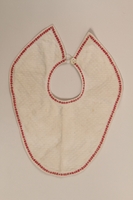
White baby's bib with red trim worn by a Jewish infant while living in hiding
Object
White baby bib with red trim made for and worn by Betti Blaugrund when, as an infant, she lived in hiding with Louise and Udile Ceulemans-Gryson in Aarschot, Belgium. Betti was three months old when the Gryson's gave her a safe home in October 1942. Betti's parents, Cypra and Wolf, fled to France when Belgium was occupied by Germany in May 1940, but returned because of antisemitism. In summer 1942, the Germans acted on their plan to get rid of all the Jews in Belgium. Betti was born on July 16. The family was told to report for forced labor. They suspected they would be deported and went into hiding. It was too unsafe to hide with a baby, so Cypra found a non-Jewish woman who agreed to look after Betti for money. Cypra and Wolf hid in an apartment with several family members. One day, while Cypra was out visiting Betti, the home was raided by Germans. Nine people in the house were arrested; only Wolf escaped and warned Cypra not to come home. They found a new place to hide and found a Gentile family in the country to provide better care for Betti. The Grysons loved the baby like their own and took her to see her mother every month as promised. Belgium was liberated by Allied Forces in September 1944 and Betti rejoined her parents. Both Cypra and Wolf were from very large families and nearly all of their relatives perished.
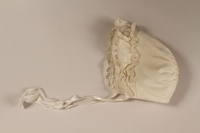
White lace baby bonnet used postwar by a former hidden child
Object
White cloth and lace baby bonnet used after the war by Betti Blaugrund to clothe the doll, 2011.424.1, that had belonged to her cousin Aline Klajn. Betti's parents, Cypra and Wolf, and Aline, her parents Idessa and Wigdor, and younger brother Jacques, fled to France when Belgium was occupied by Germany in May 1940, but returned because of antisemitism. In summer 1942, the Germans acted on their plan to get rid of all the Jews in Belgium. Betti was born on July 16. The families were told to report for forced labor. They suspected that they would be deported and went into hiding. Cypra and Wolf hid in an apartment with family members; Aline and her family were given refuge with a nearby couple, Alfred and Clara Duval. It was too unsafe to hide with a baby, so Cypra found a non-Jewish woman who agreed to look after Betti for money. On October 20, while Cypra was out visiting Betti, the home was raided by Germans. Aline and her family were there visiting and all nine people in the house were arrested. Wolf escaped and warned Cypra not to come home. Aline, 7 years old, and the others were deported to Auschwitz on October 24 and killed. Wolf and Cypra found a new place to hide and placed Betty with a Gentile family in the country. Belgium was liberated by Allied Forces in September 1944 and Betti rejoined her parents. Both Cypra and Wolf were from very large families and nearly all of their relatives perished.
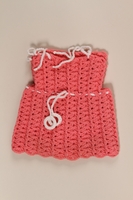
Pink and white crocheted doll dress used postwar by a former hidden child
Object
Pink and white crocheted doll dress used after the war by Betti Blaugrund to clothe the doll, 2011.424.1, that had belonged to her cousin Aline Klajn. Betti's parents, Cypra and Wolf, and Aline, her parents Idessa and Wigdor, and younger brother Jacques, fled to France when Belgium was occupied by Nazi Germany in May 1940, but returned because of antisemitism. In summer 1942, the Germans acted on their plan to get rid of all the Jews in Belgium. Betti was born on July 16. The families were told to report for forced labor. They suspected that they would be deported and went into hiding. Cypra and Wolf hid in an apartment with several other family members; Aline and her family were given refuge with a nearby couple, Alfred and Clara Duval. It was too unsafe to hide with a baby, so Cypra found a non-Jewish woman who agreed to look after Betti for money. On October 20, while Cypra was out visiting Betti, the home was raided by Germans looking for Jews. Aline and her family were there visiting and all nine people in the house were arrested. Wolf escaped and warned Cypra not to come home. Aline, 7 years old, and the others were deported to Auschwitz on October 24 and killed. Wolf and Cypra found a new place to hide and placed Betty with a Gentile family in the country. Belgium was liberated by Allied Forces in September 1944 and Betti rejoined her parents. Both Cypra and Wolf were from very large families and nearly all of their relatives perished.
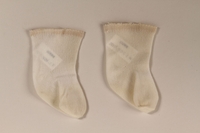
Pair of white infant socks used postwar by a former hidden child
Object
Pair of white baby socks used after the war by Betti Blaugrund to clothe the doll, 2011.424.1, that had belonged to her cousin Aline Klajn. Betti's parents, Cypra and Wolf, and Aline, her parents Idessa and Wigdor, and younger brother Jacques, fled to France when Belgium was occupied by Nazi Germany in May 1940, but returned because of antisemitism. In summer 1942, the Germans acted on their plan to get rid of all the Jews in Belgium. Betti was born on July 16. The families were told to report for forced labor. They suspected that they would be deported and went into hiding. Cypra and Wolf hid in an apartment with several other family members; Aline and her family were given refuge with a nearby couple, Alfred and Clara Duval. It was too unsafe to hide with a baby, so Cypra found a non-Jewish woman to look after Betti for money. On October 20, while Cypra was out visiting Betti, the home was raided. Aline and her family were visiting and all nine people in the house were arrested. Wolf escaped and warned Cypra not to come home. Aline, 7, and the others were deported to Auschwitz on October 24 and killed. Wolf and Cypra found a new place to hide and placed Betty with a Gentile family in the country. Belgium was liberated by Allied Forces in September 1944 and Betti rejoined her parents. Both Cypra and Wolf were from very large families and nearly all of their relatives perished.



